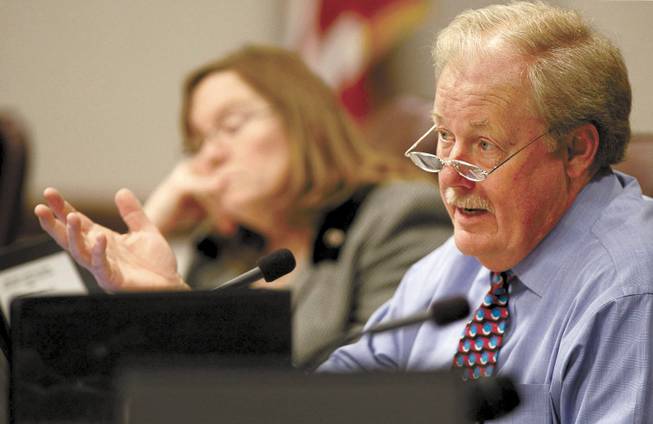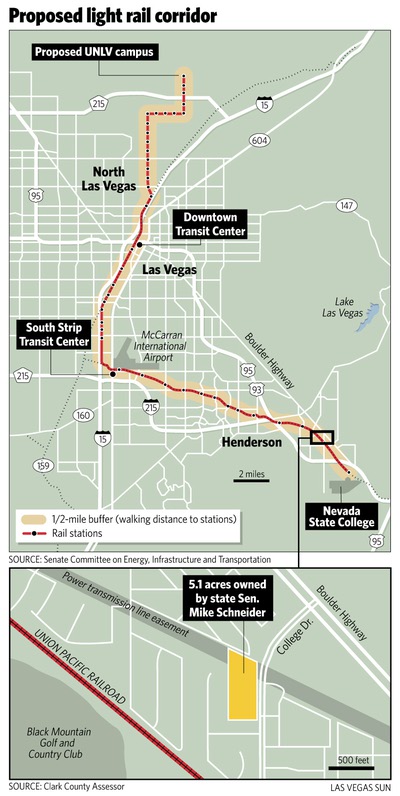
Nevada Appeal File
State Sen. Mike Schneider wants the state to take steps toward a Southern Nevada light rail system. Schneider, a development consultant, owns property near the proposed line.
Thursday, March 5, 2009 | 2 a.m.
Reader poll
Sun Archives
Sen. Mike Schneider, chairman of the committee on energy, transportation and infrastructure, has proposed a bill to begin the process of bringing light rail to Southern Nevada.
Mass transit advocates and urban planners say this is smart policy, a way to reduce road traffic and provide people with more transportation and living options.
But Schneider, who will hear testimony on the bill today, has more at stake than just sound long-term public policy.
The Las Vegas Democrat owns five-acre parcel close to the proposed light rail line, just north of its end point, Nevada State College in Henderson.
In other cities that have built light rail systems, including Denver, Portland, Ore., and Salt Lake City, property values near rail stations have increased, often significantly, as developers eye prime spots for retail and upscale condos and apartments because people want to live and shop near transit.
Schneider said as much in a Sun interview: “Neighborhood gets better. Property values soar. Old strip malls come back and are rehabbed.”
He said his parcel is zoned mixed-use, high-density — ideal for the transit-oriented development that has exploded in light rail cities.
The long-term plan for light rail would begin with Schneider’s legislation, SB115, which would force local governments to begin buying rights-of-way for a “Fixed Guideway Corridor” for the eventual tracks.
The proposed route begins at Nevada State College, runs along the resort corridor to downtown and north to a proposed North Las Vegas campus of UNLV. The route is apparently derived from a Regional Transportation Commission advisory panel that began meeting in 2004 and made recommendations for light rail and a potential route for it in 2006, according to the RTC.
Schneider, a development consultant with property all over the valley, said the planning and construction of the eventual line could take a decade or more. He said he’d be out of his property long before then.
When asked whether it’s appropriate for him to propose the legislation, he replied: “We are a citizen Legislature, and if you don’t want me to own anything, and you want dumb shits up here, we can find them.”
Schneider is hardly alone in his active participation in legislation that could affect his finances. State Sen. Warren Hardy, R-Las Vegas, faces an ethics complaint that alleges he inappropriately blended his job as senator with his full-time work as president of the Las Vegas chapter of Associated Builders and Contractors, a business lobbying group.
State Sen. Terry Care, D-Las Vegas, is leading the effort to reform construction-defect law; his law partner is general counsel of the Nevada chapter of the Associated General Contractors and said he lobbied Care on the issue.
Just before the session began, state Sen. Mark Amodei, R-Carson City, left his job as president of the Nevada Mining Association.
Also, the Legislature is filled with teachers, court administrators and other public sector employees who vote on their own salaries. Labor unions are represented, too.
Nevada law is clear:
“A public officer or employee shall not use his position in government to secure or grant unwarranted privileges, preferences, exemptions or advantages for himself, any business entity in which he has a significant pecuniary interest ...”
The problem: Who to enforce this law. A District Court judge recently ruled that the state Ethics Commission has no authority to discipline legislators because the doctrine of separation of powers requires the legislators to police themselves.
State Supreme Court will hear an appeal.
Nevada political scientists say the nature of the part-time citizen Legislature means the people’s elected representatives have to earn a living outside their work as lawmakers, which makes some of these conflicts unavoidable.
The law instructs legislators to disclose the conflicts and abstain from voting when appropriate, which they do with varying consistency.
In fact, the conflicts are so widespread that a consensus seems to have emerged in Carson City: Everyone does it, so no one is guilty.
Nevada political scientists laughed wryly at Schneider’s light rail plan and his fortunate property ownership and said surely it was just coincidence.
“I love this state,” said Eric Herzik, chairman of political science at the University of Nevada, Reno.
“These guys are great,” said David Damore, a UNLV political scientist.
But they also said the pervasive attitude of nonchalance toward these conflicts is not without consequence.
“Even if it’s good policy, you are undermining the credibility of it by doing this. You avoid this because then the public has more faith in the honesty of the project,” Herzik said.
Damore agreed: “This feeds that perception among voters that they’re not in it for public service,” he said.


Join the Discussion:
Check this out for a full explanation of our conversion to the LiveFyre commenting system and instructions on how to sign up for an account.
Full comments policy